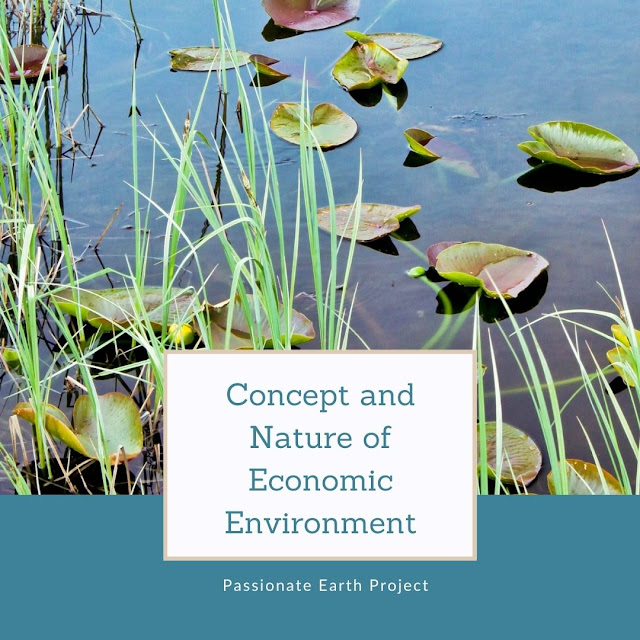Concept and Nature of Economic Environment
The concept of the economic environment is a crucial aspect of understanding the dynamics of our world. The Passionate Earth Project explores various dimensions of our environment and its impact on human life. In this discussion, we delve into the concept and nature of the economic environment, a multifaceted domain that significantly influences our societies, economies, and daily lives.
Understanding the Economic Environment:
The economic environment refers to the sum of external factors and conditions that affect an organization, society, or nation's economic performance and prospects. It encompasses elements like economic policies, market conditions, financial systems, technological advancements, and more. The economic environment plays a vital role in shaping the future of nations and businesses, making it a subject of intense interest for scholars, policymakers, and visionaries alike.
Key Components of the Economic Environment:
1. Government Policies: Government policies, especially economic ones, are a cornerstone of the economic environment. These policies include taxation, trade regulations, monetary policies, and fiscal strategies that impact business operations, investment climate, and overall economic growth.
2. Market Conditions: The state of markets, both local and global, significantly influences economic activities. Factors such as supply and demand, competition, consumer behavior, and market trends contribute to shaping the economic landscape.
3. Technological Advancements: Rapid technological progress is an integral part of the modern economic environment. Innovations affect productivity, efficiency, and job creation, and they often create disruptive changes in industries.
4. Global Economic Trends: In today's interconnected world, the global economic environment is crucial. Factors like international trade, currency exchange rates, and geopolitical tensions have far-reaching implications on national economies.
5. Financial Systems: Banking, financial institutions, and capital markets are the pillars of any economic system. The stability and efficiency of these systems are crucial to a healthy economic environment.
The Nature of the Economic Environment:
1. Dynamic and Ever-Changing: The economic environment is in a constant state of flux. Markets evolve, technologies advance, and governments adapt policies to address new challenges. This dynamic nature makes it essential to stay updated and agile in response.
2. Interconnected: The economic environment is a complex web of interconnected factors. A change in one element can trigger a chain reaction that affects various sectors, organizations, and even countries. The 2008 financial crisis is a prime example of how interconnectedness can lead to a global economic downturn.
3. Cyclical: Economies tend to move in cycles of expansion, peak, contraction, and trough. Understanding these cycles helps businesses and policymakers make informed decisions, such as when to invest or save during economic ups and downs.
4. Influential on Social and Environmental Aspects: The economic environment doesn't operate in isolation. It has a profound impact on social and environmental dimensions. Economic decisions can affect income inequality, employment rates, and sustainability goals.
The Passionate Earth Project's Perspective:
The Passionate Earth Project recognizes the intertwined relationship between the economic environment and environmental sustainability. As the global community confronts climate change and resource depletion, the economic environment's role in shaping policies, investments, and incentives is pivotal.
This project aims to promote a more sustainable economic environment by advocating for green policies, sustainable business practices, and responsible consumer behavior. By highlighting the interplay between economic decisions and environmental consequences, it strives to inspire a new era of conscious and responsible economics.
Conclusion:
The concept and nature of the economic environment are central to the success and well-being of nations, organizations, and individuals. The economic environment is not static but rather a dynamic, interconnected, and influential force that shapes the world we live in. Recognizing its importance and understanding its components are crucial steps towards creating a more sustainable and prosperous future.
The Passionate Earth Project's commitment to promoting a responsible and sustainable economic environment aligns with the broader mission of building a harmonious world where economic prosperity coexists with environmental stewardship. As we move forward, it is essential to embrace this perspective to meet the challenges of our times and ensure a thriving planet for generations to come.



Comments
Post a Comment